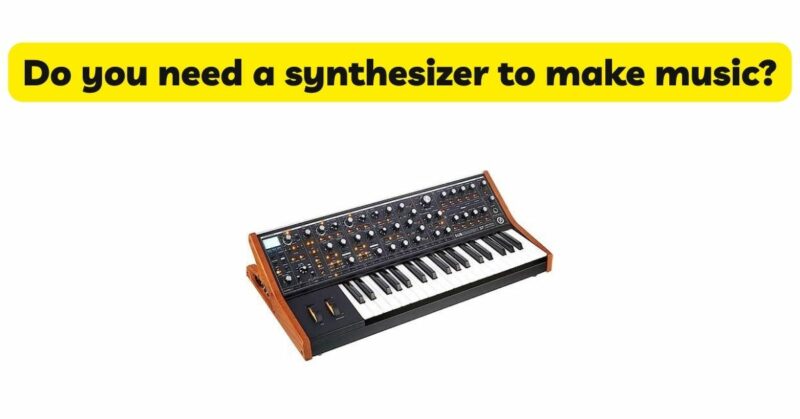In the ever-evolving landscape of music production, synthesizers have become synonymous with electronic music. However, one question that often arises is whether a synthesizer is a necessity for creating music. In this article, we will delve into the world of music production and explore the role of synthesizers while also considering alternative methods and tools that can be used to create music without solely relying on synthesizers.
Understanding Synthesizers: To understand the role of synthesizers in music production, it is crucial to comprehend their purpose. Synthesizers are electronic instruments that generate and manipulate sounds using various techniques such as oscillators, filters, and modulation. They offer a vast range of sonic possibilities, from emulating traditional instruments to producing futuristic and experimental sounds. Synthesizers have played a significant role in shaping popular genres like electronic, pop, and even rock music.
Synthesizers in Music Production: Synthesizers are widely used in music production for several reasons. First and foremost, they provide musicians and producers with the ability to create unique and distinctive sounds that may be difficult or impossible to achieve with traditional instruments alone. Synthesizers allow for the exploration of sonic textures and the creation of complex layers that contribute to the overall depth and richness of a composition.
Additionally, synthesizers offer a level of versatility that enables producers to experiment with different genres and styles. They can replicate the sound of traditional instruments, opening up a world of possibilities for composers and producers who may not have access to a full orchestra or a wide array of physical instruments. Synthesizers can also create entirely new sounds, pushing the boundaries of musical expression and offering a unique sonic identity to a composition.
Alternative Tools and Methods: While synthesizers have their place in music production, they are by no means the only option available. In recent years, advancements in technology and software have democratized music production, making it more accessible and affordable. Digital audio workstations (DAWs) provide a platform for creating music using virtual instruments, samples, and recordings, eliminating the need for physical synthesizers.
Virtual instruments, also known as software synthesizers or plugins, offer a vast library of sounds that can be accessed directly within a DAW. These instruments emulate the characteristics and nuances of various synthesizers and instruments, providing an extensive palette of sounds for music production. With virtual instruments, musicians and producers can create music without the need for physical hardware, making it more cost-effective and portable.
Furthermore, sample libraries have become an integral part of modern music production. These libraries contain pre-recorded sounds, including individual instrument samples, loops, and percussion elements. By utilizing samples, producers can incorporate realistic instrument sounds into their compositions without the need for a physical synthesizer or extensive programming knowledge.
Hybrid Approaches: Another approach gaining popularity in music production is a hybrid setup that combines physical synthesizers with software-based instruments and samples. This combination allows for the best of both worlds, leveraging the tactile control and unique characteristics of hardware synthesizers while taking advantage of the vast sound libraries and flexibility of software instruments.
Hybrid setups often involve using hardware synthesizers for their specific sound capabilities and connectivity options, integrating them with a DAW and virtual instruments for further sound manipulation and production workflow enhancements. This approach provides a personalized and versatile setup tailored to the individual preferences and musical needs of the producer.
Conclusion: While synthesizers have long been a staple in music production, they are not the sole requirement for creating music. The role of synthesizers in music production is to provide a wide range of sounds and creative possibilities, enabling musicians and producers to explore new sonic territories. However, with the advancements in technology, alternative tools and methods have emerged, allowing for music creation without the need for physical synthesizers.
Whether using virtual instruments, sample libraries, hybrid setups, or a combination of these approaches, music production has become more accessible and versatile than ever before. The choice of tools ultimately depends on the individual’s preferences, musical goals, and budget. The most important aspect is to embrace creativity and experimentation, utilizing the available tools to bring one’s musical vision to life. In the end, it is the artist’s expression and passion that truly matter, regardless of the tools used in the process.

